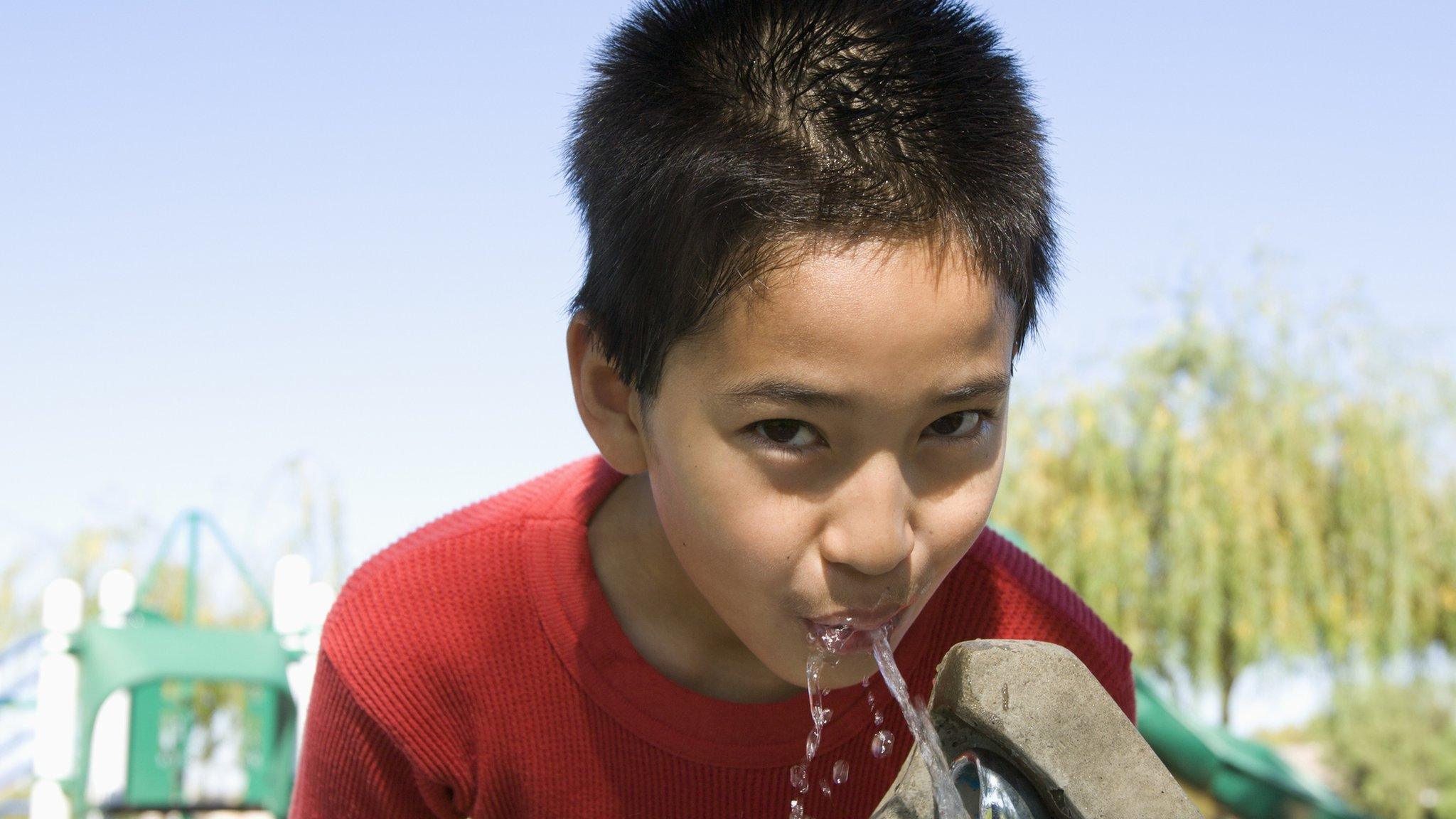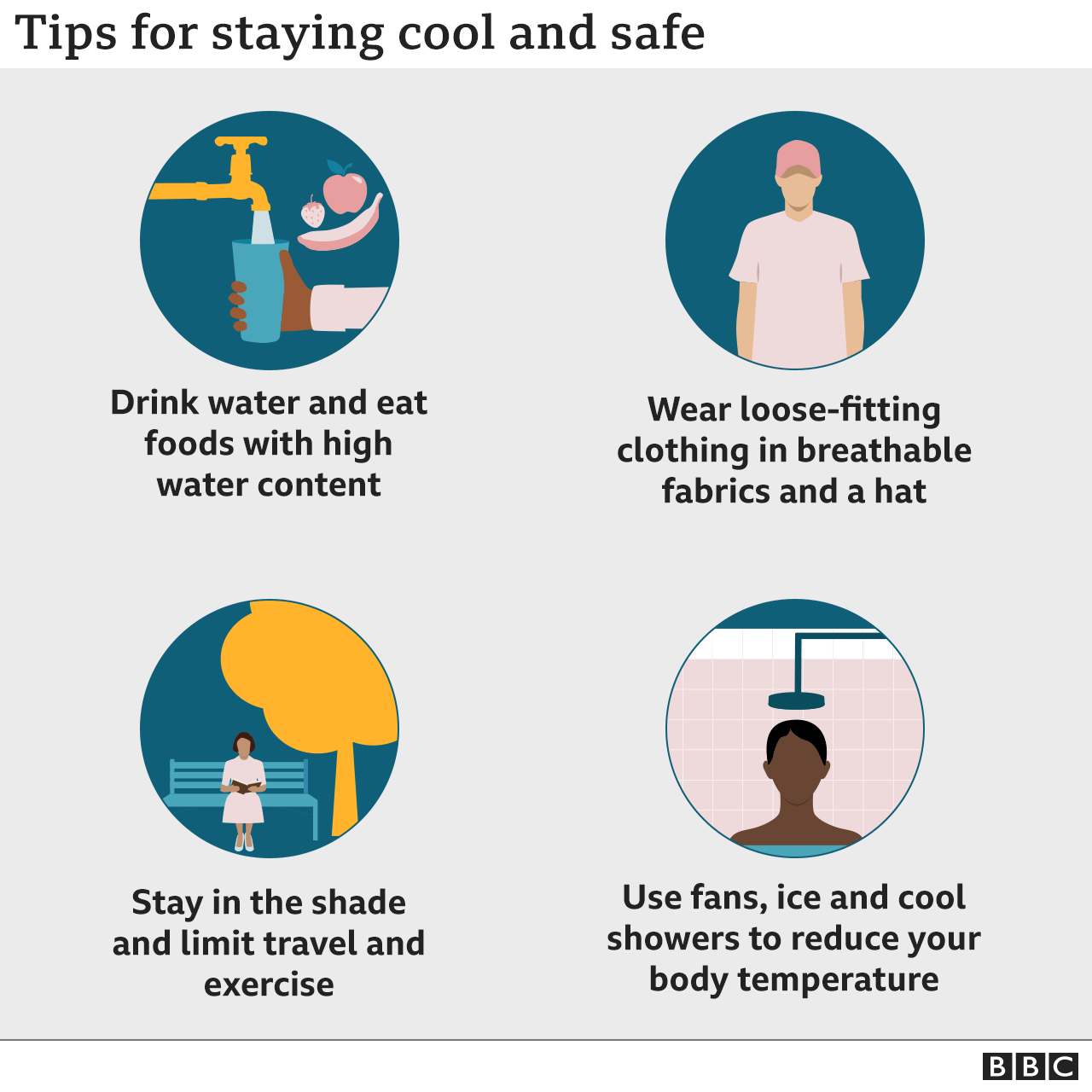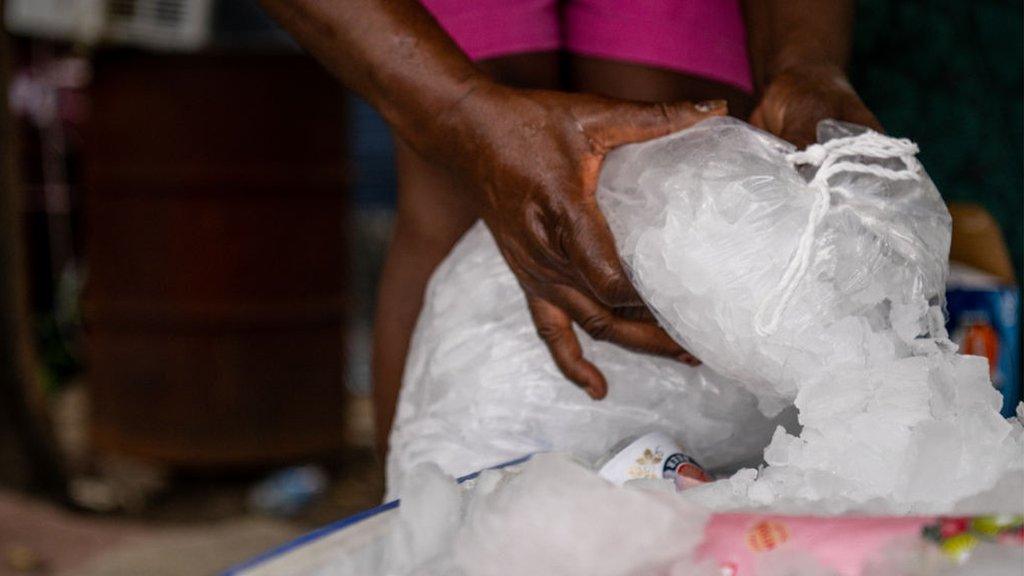What do heatwaves do to the body and who is most at risk?
- Published
Watch: The heat index explained in 90 seconds
Heatwaves will become more frequent as the world continues to warm, bringing the increased likelihood of dangerously high temperatures.
Heat can affect anyone, but some vulnerable groups, like older people and babies, run a greater risk of serious harm.
Here's what you need to know about the effects of heat on the body and how to stay cool.
What does extreme heat do to our bodies?
As the body gets hotter, blood vessels open up. This leads to lower blood pressure and makes the heart work harder to push the blood around the body.
This can cause mild symptoms such as an itchy heat rash or swollen feet as blood vessels become leaky.
At the same time, sweating leads to the loss of fluids and salt and, crucially, the balance between them in the body changes.
This, combined with the lowered blood pressure, can lead to heat exhaustion. Symptoms include:
dizziness
nausea
fainting
muscle cramps
headaches
heavy sweating
tiredness
cold, pale and clammy skin
If blood pressure drops too far, the risk of heart attacks rises.
Why do our bodies react this way?
Our bodies strive to keep a core temperature of about 98F (37C) whether we're in a snowstorm or a heatwave.
It is the temperature our bodies have evolved to work at.
But as the weather gets hotter, the body has to work harder to keep its core temperature down.
It opens more blood vessels near the skin to lose heat to our surroundings and starts sweating.
As the sweat evaporates, it dramatically increases the heat lost from the skin.

How can I stay safe in the heat?
The Centers for Disease Control and Prevention (CDC) has some tips:
Wear appropriate clothing that is lightweight and loose-fitting
Stay in an air-conditioned place as much as possible. If your home does not have air conditioning, go to the shopping mall or the public library
You can also call your local health department to see if any heat-relief shelters are open in the area
Limit outdoor activity or reschedule to when the temperature is cooler
Drink plenty of fluids and don't drink too much alcohol
Keep in the shade, use sunscreen with a high SPF and UVA rating, and wear a wide-brimmed hat
Look out for those who may struggle to keep cool, such as older people, those with underlying conditions and those who live alone
Don't leave anyone, especially babies, young children and animals, in a locked vehicle
How can I get a good night's sleep?
Use thin sheets, cool your socks in the fridge before putting them on and stick to your usual bedtime routine, experts say.
What should I do if I see someone with heat exhaustion?
If they can be cooled down within half an hour, then heat exhaustion is not normally serious.
CDC advice, external says:
Move them to a cool place.
Cool their skin by spraying them with water
Get them to drink plenty of water
However, if they do not recover within 30 minutes, then what follows is heat stroke.
It is a medical emergency and you should call 911.
People with heat stroke may stop sweating even though they are too hot. Their temperature could go over 104F (40C) and they might have seizures or lose consciousness.

Who is more at risk?
Old age or some long-term conditions, such as heart disease, can leave people less able to cope with the strain heat puts on the body.
Diabetes can make the body lose water more quickly and some complications of the disease can alter blood vessels and the ability to sweat.
Children and those who are less mobile may also be more vulnerable. Brain diseases, such as dementia, can also leave people unaware of the heat or unable to do anything about it.
People who are homeless will also be more exposed to the sun. Those living in top-floor flats will also face higher temperatures.
Do some drugs increase the risk?
Yes - but people should keep taking their medication as normal and need to make more effort to stay cool and hydrated.
Diuretics - sometimes called "water pills" - increase the amount of water the body expels. They are taken widely, including for heart failure. In high temperatures, they increase the dangers of dehydration and imbalances in key minerals in the body.
Antihypertensives - which lower blood pressure - can combine with the blood vessels that are dilating to cope with the heat and cause dangerous drops in blood pressure.
Some drugs for epilepsy and Parkinson's can block sweating and make it harder for the body to cool itself.
And other drugs such as lithium or statins can become more concentrated and problematic in the blood if there is too much fluid loss.

Does heat kill?
More than 700 people in the US are killed by extreme heat each year, according to the CDC.
Most of these will be heart attacks and strokes caused by the strain of trying to keep body temperatures stable.
The higher death rate starts to kick in once the thermometer passes 77F-79F (25C-26C).
However, the evidence suggests the deaths tend to be caused by higher temperatures in spring or early summer rather than "peak summer".
This could be because we start to change our day-to-day behaviour as summer progresses and we get more used to dealing with the heat.
The evidence from previous heatwaves is the increase in deaths happens very quickly - within the first 24 hours of the heatwave.
Follow James on Twitter., external
Related topics
- Published29 June 2023

- Published28 June 2023

- Published13 July 2023
